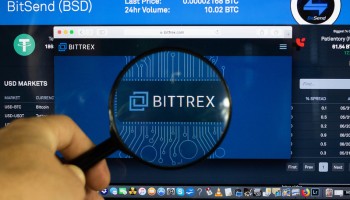Reported by
The Treasury Department on Monday warned financial institutions to monitor and report suspicious activity at so-called crypto ATMs, which have been used to launder proceeds from drug sales and other criminal activity.
Formally known as convertible currency kiosks, or CVC kiosks, these machines operate similar to automated bank teller machines. They allow customers to exchange real currency for virtual currencies and vice versa.
“While CVC kiosks can be a simple and convenient way for consumers to access CVC, scammers and other illicit actors can also exploit their simplicity and convenience,” said a first-of-its kind notice about kiosks from the Financial Crimes Enforcement Network, or FinCEN.
An OCCRP investigation in July 2024 warned how these machines were increasingly being used by criminal networks at home and abroad to exploit seniors. For that report, the FBI shared its first public national estimate on the scope of the problem, suggesting losses from scams carried out using crypto kiosks exceeding $120 million in 2023.
In its notice Monday, FinCEN offered new FBI data points on the scope of the problem. It said the FBI’s Internet Crime Complaint Center (IC3) received 10,956 complaints of fraudulent or criminal schemes involving crypto kiosks, with reported losses to victims of about $246.7 million.
“This represents a 99 percent increase in the number of complaints and a 31 percent increase in reported victim losses from 2023,” FinCEN said in its notice.
FinCEN had warned on crypto kiosks in 2019, but in the context of how the illicit actors were using crypto currencies to launder ill-gotten gains such as proceeds from drug sales.
The new notice said that analysis of Bank Secrecy Act (BSA) information confirms the use of crypto kiosks in laundering suspected drug proceeds.
“The Drug Enforcement Administration (DEA) reports that transnational criminal organizations (TCOs) such as Cartel Jalisco Nueva Generación are increasingly adopting CVC because it enables rapid international funds transfers,” FinCEN said. “In areas that face a significant drug-related threat and that have a significant number of CVC kiosks, TCOs may launder money through CVC kiosks as an alternative to bulk cash smuggling.”
The 12-page notice identified a number of red flags that financial institutions should be looking for, and reminded institutions of federal requirements to report suspicious activities involving transfers of cash and cryptocurrency.
Crypto kiosks have also become an area of increased interest because of the rise of so-called pig butchering scams. These involve scammers earning the trust of someone they've met online, sometimes romance scams and sometimes as an imposter in emails warning that a computer has been hacked or infected.
The scammers, often in a foreign country, gain trust and convince the victim to deposit and send real money to them by converting it in crypto currencies at a local crypto ATM.
The OCCRP report last year found that crypto kiosks are generally located in poorer areas, often in gas stations, laundromats and other storefronts with lots of foot traffic.






